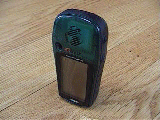 As this story in the Seattle Times suggests, the effectiveness of a wildlife refuge is directly linked to how well you can protect what is inside it: “… an international black market … fuels the illegal slaughter of an estimated 500 eagles each year in southwest British Columbia alone, and an unknown number in Washington state.”
As this story in the Seattle Times suggests, the effectiveness of a wildlife refuge is directly linked to how well you can protect what is inside it: “… an international black market … fuels the illegal slaughter of an estimated 500 eagles each year in southwest British Columbia alone, and an unknown number in Washington state.”
Many nature preserves around the world have little or no protection, making them essentially worthless as preserves. There are not enough funds to hire an army of forest rangers to be everywhere all the time. The biggest problem with any system that relies on guys randomly driving around in pickup trucks is that 99.9% of the time nothing is happening, and when something does happen, it happens where the rangers aren’t. Preventing poachers from killing hundreds of eagles is better than prosecuting them after the fact.
Maybe we should be using technology to protect the planet instead of destroy it? Like E.O. Wilson once said:
The race is now on between the technoscientific forces that are destroying the living environment and those that can be harnessed to save it.
 Just how difficult would it be to set up solar-powered security systems in critical wildlife habitats like eagle feeding areas? It is now entirely feasible. Solar powered webcams are used all over the place to observe wildlife. Infrared motion sensors can be hidden in key areas. When tripped, a digital image can be transmitted to a ranger’s cell phone. The ranger puts his coffee down, takes a look, and makes a decision. If the image portrays a couple of shady-looking characters with high-powered rifles he may call for backup and get hopping. If it portrays a family on a hike he may go back to eating his pie and swapping lies with the locals.
Just how difficult would it be to set up solar-powered security systems in critical wildlife habitats like eagle feeding areas? It is now entirely feasible. Solar powered webcams are used all over the place to observe wildlife. Infrared motion sensors can be hidden in key areas. When tripped, a digital image can be transmitted to a ranger’s cell phone. The ranger puts his coffee down, takes a look, and makes a decision. If the image portrays a couple of shady-looking characters with high-powered rifles he may call for backup and get hopping. If it portrays a family on a hike he may go back to eating his pie and swapping lies with the locals.
Part of the ranger’s job description might be to find and maintain the security systems. Recording the GPS coordinates of each one would make finding them a snap. The coordinates would have to be kept secret of course — how fun. Trusted geocaching enthusiasts might volunteer to find and replace batteries or damaged parts, keeping costs down.
I am not suggesting that we destroy the privacy of hiking by installing voyeur cams at campsites — not that there is anything wrong with voyeur cams. I am suggesting a simple system along trails and logging roads to provide data to a given park-security service to help it protect preserves. Digital cameras (and robots) don’t suffer from boredom, nor do they have short attention spans. Patiently watching for days, weeks, months, or even years for something to happen is fine with them. They also don’t cheat, lie, steal, compete for dominance, or even need a paycheck.
 As this story in the
As this story in the 

